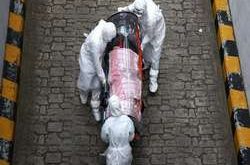
Onf does not agree with the proposal to increase fines for traffic violations.
The organization believes that tabled the amendments to the Cao do not correspond to the socio-economic situation in the country.
MOSCOW, February 7. /TASS/. Experts of the Russian popular front (onf) opposed the initiative to increase penalties for drivers for violation of traffic rules. This was reported on Friday the press-service of the project “Road inspection onf/Map of dead roads.”
According to the interior Ministry, the number of detected speeding violations increases each year. In 2016, there were more than 53 million, in 2017 – more than 69 million, in 2018 nearly 90 million due to speeding every year there is a significant number of accidents. So, in 2018, for this reason, there were more than 3.5 thousand accidents, which killed 668 people and 4615 suffered.
“Document on changes to the administrative code rightly caused great indignation of the citizens. It considers neither the social position of the people, nor the severity of the consequences occurring in case of violation of certain rules of the road” – are reported words of the head of the project “Road inspection onf/Map of dead roads”, state Duma Deputy Alexander Vasiliev.
The press service said that onf created a working group which will consider new draft Cao from the Ministry of justice and formulate its own proposals. It was headed by the coordinator of the public movement “Blue buckets” Peter Shkumatov. The working group included well-known lawyers and human rights activists, journalists of the leading Federal mass media, heads of relevant professional associations, coordinators and experts of the public movement “Blue buckets”, said the front.
“Tabled the amendments to the Cao do not correspond to the socio-economic situation in the country and can reasonably be applied under the existing system of administrative traffic violations. The question that the discussion was formulated as a key for the necessary document, under the law the punishment should be aimed at preventing future violations from a specific person. Punishment doesn’t have to be in monetary form, world experience shows that there are a number of other tools to stimulate good behavior on the roads. Existing legal mechanisms to motorists that do not stimulate”, – stated in a press release.
The onf said that Cao based “concept has not changed since the 70-ies of the last century, it is obsolete, does not take into account modern technologies and methods of interaction between citizens and state institutions.” “In the framework of the tasks of the national project “Digital economy” already today it is possible to rank drivers according to risk groups using the digital profile of the driver”, – stated in the message.
According to the head of competence center of ANO “international Eurasian forum “Taxi” Stanislav Shvagerus, the introduction of such a system would encourage drivers to avoid traffic violations as “full Bank of information about them ultimately left the offender, persistent offender and without a driver’s license, and possibly much more severe punishment than administrative.”
The onf said that by the end of the public comment – February 27 – the working group onf “plans to prepare the conceptual framework of the observations, verified and agreed upon by all members of the group”. “Until the end of may experts are going to prepare has a full set of amendments which I wish to submit for public discussion in the regions”, – stressed in the front.
The new penalties. Published January 30, the new draft of the administrative code is proposed to increase the penalties for various traffic violations: speeding, refusal of medical examination, attempting to escape. Understand what propose to change.
For speeding 20 to 40 km/h it is proposed to introduce a fine of up to 3 thousand rubles (now 500 rubles), from 40 to 60 km/h – up to 4 thousand roubles (now from one thousand to 1.5 thousand), more than 60 km/h – 5 thousand roubles (now from 2 to 2,5 thousand rubles), or the driver can be deprived the rights for a period of four to six months. For repeated violation the fine can be up to 10 thousand rubles, the driver can also be deprived of the rights for one year. For refusal of medical examination of the amount of the fine is proposed to increase from 30 to 40 thousand roubles, and term of deprivation of the right to raise to two or three years (currently 1.5-2 years).
In the code it is proposed to add two new articles, introducing administrative liability for dangerous driving (a fine of 5 thousand rubles) and for re-driving with excessive toning (fine of 3 thousand rubles). In addition, the new administrative code is proposed to introduce a funded system for the worst violators of traffic rules – the driver who has violated the rules more than three times, may be deprived of the rights for the term from one year till one and a half years. But this rule will not apply to violations complexes of fotovideofiksatsiey.
Administrative fine for transporting children without car seats, according to the project, will increase for drivers with 3 to 5 thousand rubles, for officials – from 25 to 30 thousand rubles, for legal entities – from 100 to 150 thousand rubles. It also introduces a fine for individual entrepreneurs, it will be up to 35 thousand rubles.
As explained in the Ministry of justice, these changes were prepared by the interior Ministry even for inclusion in the administrative code, but in connection with beginning of development of the new code, it was decided to include them in the project of the future of the administrative code.
Meanwhile, the Prime Minister of the Russian Federation Mikhail Mishustin urged being cautious about increasing the penalties, as, for example, to increase the fine for speeding up to 5 thousand rubles unaffordable for many drivers.
© 2020, paradox. All rights reserved.





